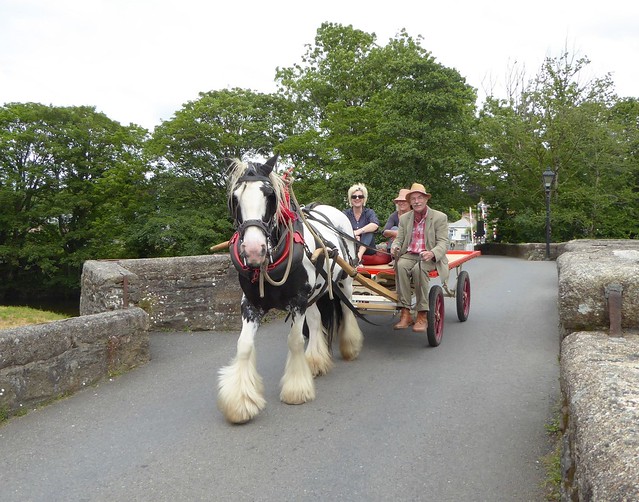Today we’re looking at words for magic, spells, charms, prayers and related things in Celtic languages.
| Proto-Celtic | *brixtā = spell, magical formula, incantation |
|---|---|
| Celtiberian | *bruxtia |
| Gaulish | brixtia |
| Old Irish (Goídelc) | bricht = charm, spell, incantation |
| Middle Irish (Gaoidhealg) | bricht = incanation, charm, magic spell |
| Irish (Gaeilge) | briocht = charm, spell, amulet briocht sí = fairy charm briocht a chanadh = to chant a spell briocht draíochta = magic spell |
| Proto-Brythonic | *briθ [ˈbriːθ] = charm, incantation |
| Middle Welsh (Kymraec) | lleturith, lledrith, ledryth = magic, spell, charm, enchantment llethrithawc, lledrithyawc, lleturithawc = magic, magical, enchanted |
| Welsh (Cymraeg) | lled(f)rith = magic, spell, charm, enchantment; apparition, spectre, phantom; illusion, delusion, fantasy, imagination lledrithaid = pretence, dissembling, deception lledrithiaf, lledrithio = to counterfeit, fake, pretend, simulate lledrithiog = magic, magical, enchanted |
| Old Breton | brith = charm, incantation (?) |
| Breton (Brezhoneg) | bre = incantation, magic |
Etymology: from the Proto-Indo-European *bʰerHǵ- (enlighten). Words that probably come from the same Proto-Celtic root, via the Celtiberian *bruxtia, include bruja (witch, crone, hag, owl) in Spanish, bruxa (witch, hex) in Galician, bruxa (witch) in Portuguese, and bruixa (witch) in Catalan [source].
| Old Irish (Goídelc) | druídecht, draídecht = magic, wizardry, secret lore and arts of the druids |
|---|---|
| Middle Irish (Gaoidhealg) | druídecht, draídecht, dráoidheachd = secret lore and arts of the druids, occult science, wizardry |
| Irish (Gaeilge) | dríocht [ˈd̪ˠɾˠihaxt̪ˠə] = druidic art, druidism, witchcraft, magic, charm, enchantment draíochtach = magical, bewitching, entrancing draíochtúil = magic, magical |
| Scottish Gaelic (Gàidhlig) | draoidheachd [drɯjəxg] = magic, socery, druidism eun-draoidheachd = augury slat-draoidheachd = magic wand/td> |
| Manx (Gaelg) | druaight = charm, druid druaightagh = charmer, charming, druid, magician, occult druaightys = charming, druid, druidism, magic fo druaight = charmed |
| Welsh (Cymraeg) | derwyddiaeth [dɛrˈwəðjaɨ̯θ/dɛrˈwəðjai̯θ] = druidism, the druid cult |
| Cornish (Kerneweg) | drewydhieth = druidism |
| Breton (Brezhoneg) | drouizelezh / drouiziezh = druidism |
Etymology: these words come from the same roots as words for druid.
| Old Irish (Goídelc) | ortha = prayer, incantation, spell, charm oráit = prayer |
|---|---|
| Middle Irish (Gaoidhealg) | ortha, órtha = prayer, incantation, spell, charm orthanach = of prayers, wont to pray oróit, oráit, oráid, oraoid = prayer, speech, oration anoráit, anóráid = curse |
| Irish (Gaeilge) | ortha = incantation, spell, charm, prayer im ortha = unsalted butter used in charm-cure óráid = oration, speech, address óráideach = oratorical, declamatory. óráidí = orator, speech-maker óráidíocht = oratory, speech-making |
| Scottish Gaelic (Gàidhlig) | ortha [ɔr̪ˠə] = incantation, (magical) prayer, amulet ortha-bhàis = death incantation ortha-ghràidh = love amulet / charm òraid [ɔːrɪdʲ] = address, speech, lecture, talk òraidiche [ɔːrɪdʲɪçə] = lecturer, orator, speechmaker òraidearachd = oratory talla-òraid = lecture hall / theatre |
| Manx (Gaelg) | oraid = address, oration, speech oraatagh = orator, speaker, oratorial oraataght = oration |
| Proto-Brythonic | *arọd = prayer, oration |
| Old Welsh (Kembraec) | araut = speech, language, eloquence, address, oration |
| Middle Welsh (Kymraec) | araỽd, arawt, araỽt, arawd = speech, language, eloquence, address, oration |
| Welsh (Cymraeg) | arawd = speech, language, eloquence, address, oration, utterance, report, eulogy, prayer arawduriaeth = oratory, rhetoric |
| Middle Cornish (Cernewec) | areth = speech, oration |
| Cornish (Kerneweg) | areth = lecture, oration, speech arethek = rhetorical arethor, arethores = lecturer, orator, speaker arethva = platform arethya = to lecture |
Etymology: from Latin ōrātiō (speech, discourse, language, oration), from ōrō (to speak as an orator, plead, pray) from Latin ōs, ōris (mouth), or from Proto-Indo-European *h₂er- (to pronounce a ritual) [source].
The words for prayer and oration come from this Latin root, and the words for charm and incantation may do as well [source]. The Brythonic words come via Vulgar Latin *arātiō [source].
Words from the same roots include oration in English, oración (oration, sentence, clause, prayer) in Spanish, and oratorio (oratory, oratorio, oratorical, solemn) in Italian.
| Old Irish (Goídelc) | sén = blessing, charm, incantation, omen, prosperity, sign, snare sénaid = to bless, charm (with spell), deny, reject, repudiate, sign |
|---|---|
| Middle Irish (Gaoidhealg) | sén, seon, seún, sena, séna = sign, omen, augury, portent, incantation, charm, blessing, good luck, prosperity, happiness sénaid, seanaidh = to mark with a sign, bless, put a spell on, put a charm on |
| Irish (Gaeilge) | séan [ʃeːnˠ] = sign, omen, good luck, prosperity; to mark with a sign, to bless séanaire = diviner, augur séanaireacht = divination, augury |
| Scottish Gaelic (Gàidhlig) | seun [ʃiən] = charm, magic invocation, protective spell seunach [ʃiənəx] = charming, enchanting, charm-like seunadair [ʃiənədɪrʲ] = enchanter seunadaireachd [ʃiənədɪrʲəxg] = conjuring, enchanting seunail [ʃiənal] = charmed, magical, happy, prosperous seunmhorachd [ʃiənvərəxg] = magical power(s) seunta [ʃiən̪ˠdə] = charmed, enchanted seuntachan [ʃiəndəxan] = charm, enchantment |
| Manx (Gaelg) | sheean = charm, fortune |
| Proto-Brythonic | *suɨɣn = spell, incantation (?) |
| Middle Welsh (Kymraec) | swyn, suen, = spell, incantation, sorcery, witchcraft, magic, remedy, charm swyno, suyno = to charm, fascinate, allure, cast a spell (on), bewitch swynedig, sỽynedic, swynedic = charmed, fascinated, charming, bewitched, blessed, happy |
| Welsh (Cymraeg) | swyn [suːɨ̯n / sʊi̯n] = spell, incantation, sorcery, witchcraft, magic, remedy, charm swyn(i)o = to charm, fascinate, allure, cast a spell (on), bewitch, divine, bless, protect swynaidd = charming, enchanting swynedig = charmed, fascinated, charming, bewitched, blessed, happy swynwr, swynydd = sorcerer, magician, bewitcher, soothsayer swynyddiaeth = sorcery, witchcraft, magic |
| Middle Cornish (Cernewec) | sona, sone = to bless, hallow, sanctify, consecrate, charm zona = to charm, hallow |
| Cornish (Kerneweg) | sona = to bless, charm sonell = charm |
| Breton (Brezhoneg) | saouzan = disorientation, bewilderment, stupor, hypnosis saouzanan, saouzanañ = to disorientate, hypnotise, go astray, misplace saouzanidigezh = hypnotism saouzanus = hypnotic |
Etymology: from Latin signum (sign, mark, signal, miracle), from Proto-Italic *seknom (sign, statue), from Proto-Indo-European *sek- (to cut) or *sekʷ- (to follow). [source].
Words from the same roots include sign and signal in English, seña (sign, indication, gesture) and sino (destiny, fate, lot) in Spanish, and Segen (blessing) in German [source].
| Proto-Celtic | *soitos. *soyto- = magic |
|---|---|
| Proto-Brythonic | *hʉd = magic, charm hʉdol = charming, illusory |
| Middle Welsh (Kymraec) | hut, hud = magic, wizardry, sorcery, witchcraft hûdadwy, hydadwy = persuasive, enticing, seducible |
| Welsh (Cymraeg) | hud [hɨːd/hiːd] = magic, wizardry, sorcery, witchcraft, spell, enchantment, charm, fascination, allurement, persuasion hudadwy = persuasive, enticing, seducible hudaf, hudo = to fashion or produce by magic, conjure, cast a spell upon, enchant, charm, entice, allure, persuade, seduce, beguile hudaidd = alluring, charming, seductive hudol = charming, enchanting, enticing, alluring, illusory, deceptive, deceitful |
| Old Cornish | hudol = charming, illusory |
| Middle Cornish (Cernewec) | huder = a deceiver, hypocritic, juggler, sorcerer hudol = sorcerer |
| Cornish (Kerneweg) | hus = charm, enchantment, illusion, magic, sorcery, spell husa = to charm, create an illusion, enchant |
| Middle Breton (Brezonec) | hud = magic hudek, hudel = magic, magical hudiñ = to charm, enchant, bewitch, delight hudour = magician, wizard hudouriezh = magic |
| Breton (Brezhoneg) | hud = magic hudek = magic, magical hudour = magician, wizard |
Etymology: from the Proto-Indo-Etymology *sh₂oy-tó-s (magic), from *sh₂ey (to bind, fetter) [source]. Words from the same PIE roots include seiður (magic, witchcraft, sorcery) in Icelandic, sejd (sorcery, witchcraft, magic potion) in Swedish, and seid (magic) in Norwegian [source].
| Middle Irish (Gaoidhealg) | pis(e)óc = charm, spell, sorcery, witchcraft |
|---|---|
| Irish (Gaeilge) | piseog = charm, spell, superstition piseogach = practising charms or spells, superstitious piseogacht = superstitious practices piseogaí = charm-setter, superstitious person |
| Scottish Gaelic (Gàidhlig) | pisreag [ʃiən] = charm, spell, ensorcellment, sorcery, superstition |
| Manx (Gaelg) | pishag = charm, incantation, spell, witchcraft pishagagh = incantatory, magical, sorcerer, superstitious pishagys = enchantment, magic |
| Middle Cornish (Cernewec) | pystyc = witchery, magic, sorcery pystry = witchcraft, magic, sorcery |
| Cornish (Kerneweg) | pystri = magic, sorcery pystrier = sorcerer, warlock, wizard pystriores = sorcereress |
Etymology: probably from Latin pyxis (a small box, for holding medicines or toiletries), from Ancient Greek πυξίς (puxís – box, tablet, cylinder), from πῠ́ξος (púxos – boxwood) [source]. The Hibero-English word piseog (an evil spell, curse) comes from the same roots, via Irish [source].
| Old Irish (Goídelc) | airnigde [ˈar͈ʲn͈ʲiɣʲðʲe] = prayer, praying ar·neget = to pray |
|---|---|
| Middle Irish (Gaoidhealg) | airnigde, airnaigde, airna(i)gthe, urnaidhi, urnaith = praying, prayer airnaigid, ernaigit = to pray airnaigthech, ernaigtech, urnaigtheach = prayerful, devout |
| Irish (Gaeilge) | urnaí [uːɾˠˈn̪ˠiː / ˈʌɾˠn̪ˠi] = praying, prayer urnaitheach = prayful, devout |
| Scottish Gaelic (Gàidhlig) | ùrnaigh [ur̪ˠn̪ʲɪ] = praying, prayer ùrnaigheach [ur̪ˠn̪ʲijəx] = pertaining to or abounding in prayers |
| Manx (Gaelg) | yeearree = prayer, request, urge, wish, desire, aspiration; to solicit, importune yeearreeagh = wistful, soliciting, yearning |
Etymology: uncertain [source].
| Middle Irish (Gaoidhealg) | paitir, paidear = the Lord’s Prayer, paternoster |
|---|---|
| Irish (Gaeilge) | paidir [ˈpˠɑdʲəɾʲ / ˈpˠædʲəɾʲ] = Paternoster, prayer An Phaidir, Paidir an Tiarna = the Lord’s Prayer paidreoireacht = praying paidrín = Rosary |
| Scottish Gaelic (Gàidhlig) | paidir [padʲɪrʲ] = the Lord’s Prayer, Pater Noster, rosary |
| Manx (Gaelg) | padjer [ˈpaːʒər] = prayer, devotion Padjer y Çhiarn = the Lord’s Prayer goaill padjer = to pray, prayer |
Etymology: from Latin pater (father), the first word of the Lord’s Prayer in Latin (Pater noster) [source].
Sources: Wiktionary, Am Faclair Beag, Online Manx Dictionary, Teanglann.ie, eDIL – Electronic Dictionary of the Irish Language, In Dúil Bélrai English – Old Irish glossary, Geiriadur Prifysgol Cymru, Gerlyver Kernewek, Dictionaire Favereau, TermOfis, English – ProtoCeltic WordList (PDF), Etymological Dictionary Of Proto Celtic









